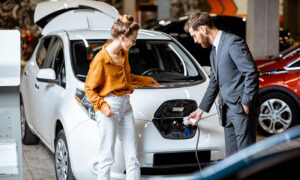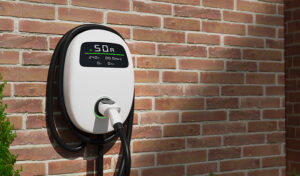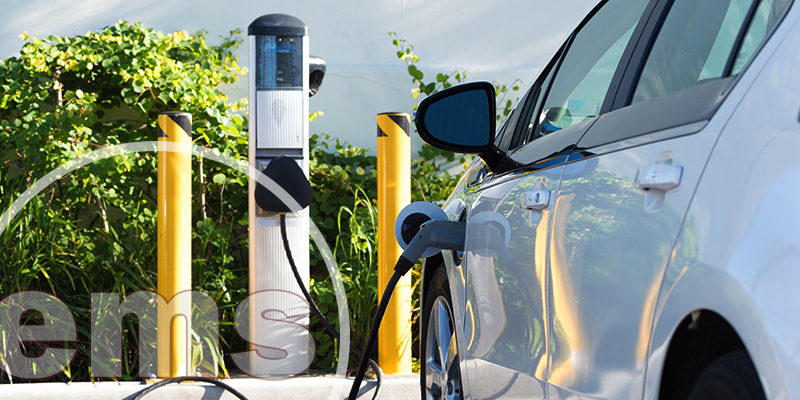Electric vehicles (EVs) have risen in popularity in recent years because of their sustainability. For this reason, many EV owners are looking to install electric car chargers in their HOA communities. But should EV chargers be allowed? Can homeowners associations implement an HOA electric car charging policy?
Can HOAs Restrict Electric Car Charging Stations?
Electric Vehicle Charging Stations in HOAs can be a contentious issue for the board and residents. After all, installing an EV charging station is no easy feat. They are expensive and often require professional help to set up, and they also cost money to maintain.
However, HOA boards should always review their governing documents before implementing any HOA electric car charging policy. Communities often have regulations regarding external alterations to common areas and homeowner property, which may apply to electric car chargers. HOA boards and homeowners should thoroughly review the rules to ensure compliance.
In addition, homeowners associations should review federal, state, and local laws before they try to restrict or regulate these chargers. Many states have already enacted laws protecting residential EV charging.
For instance, California law prohibits HOAs from enacting covenants that unreasonably restrict or effectively prohibit EV charging stations in a homeowner’s designated parking space or property. Similarly, Illinois enacted an EV Car Charging Act that requires HOAs to permit EV charging stations for both homeowners and renters.
While not all states have these protective laws in place, they may eventually follow the example of EV-friendly states and enact similar regulations. HOAs should prepare themselves to adapt to the changes.
Benefits of an HOA Electric Car Charging Policy
Homeowners associations are often strict about maintaining the external aesthetics of every home. Uniform aesthetics enhance curb appeal and preserve property values within the community, so it’s no wonder some HOAs can be apprehensive about installing a charging station in the front yard or driveway.
 However, the growing number of electric car sales in the United States means more homeowners will likely clamor for EV charging stations in the future. It may be a deal-breaker for potential buyers if an HOA adopts policies that are too restrictive regarding EV chargers. Meanwhile, communities with common-use chargers may have an edge over others.
However, the growing number of electric car sales in the United States means more homeowners will likely clamor for EV charging stations in the future. It may be a deal-breaker for potential buyers if an HOA adopts policies that are too restrictive regarding EV chargers. Meanwhile, communities with common-use chargers may have an edge over others.
Every HOA wanting to improve their community’s future should consider creating an electric vehicle charging policy. This policy aims not to prevent EV chargers altogether but to regulate how they are installed, used, and maintained. It should balance what homeowners want and protecting the HOA’s curb appeal.
What to Include in HOA Electric Car Charging Policy
An HOA electric car charging policy will vary between communities as different associations have different needs. However, boards should consider the following things when enacting their own EV charging policy.
1. Homeowner Application
An HOA electric car charging policy must outline how homeowners can propose an installation. This will help the board enforce rules consistently and allow homeowners to comply better with community rules.
The application form should include a detailed plan of the homeowner’s installation. HOAs can also require residents to consult with an insured and licensed contractor to apply. They must also clearly state who covers the cost of installation and maintenance.
2. Charging Schedule
Scheduling becomes a problem with common-use chargers. For example, the HOA may have installed only one or two chargers in the community parking lot. However, over ten homeowners want to charge their vehicles. How do you deal with scheduling?
The best way to deal with this is by using a reservation system. Owners can reserve slots to avoid scheduling issues and conflicts. HOAs can also adopt a first-come, first-served policy. Either way, the board must ensure these rules are clear to the homeowners.
3. Payment Responsibility
Before installing an EV charging station, the HOA must decide who will cover the associated expenses. This decision should be cemented with a written and signed agreement, especially if the responsibility will fall on homeowners.
3. Charger Details
The HOA must clarify all the pertinent details related to the charging station. Such details include the type of chargers to be used, the location of the station, information on the contractor, power sources, and modes of payment for the station.
4. Usage Fees and Billing
Operating a charging station can be costly, so it’s essential for HOA members to be transparent about any applied usage fees. The EV station might function similarly to gas stations, calculating the charge per battery level. Setting a usage fee can help recoup expenses involved in setting up or maintaining the station. The HOA should contact the nearest power provider to negotiate usage fees for their residents.
5. Communication
While EV charging stations offer many benefits, they can be noisy due to large fans used for cooling. Nearby residents should be informed of this beforehand. When homeowners fund the charging stations, clear communication from the HOA is essential. A detailed report on spending must be provided, ensuring transparency.
The HOA has the responsibility to keep residents informed about EV charging policies. Effective communication methods include physical or virtual community meetings, HOA software, social media, newsletters, and website posts. These tools foster community engagement and reduce misunderstandings. The HOA should also be open to updating EV policies to keep them fair and relevant as community needs evolve.
6. Future Needs
Electric vehicles are growing in popularity, so it’s reasonable to expect more EVs in the HOA community in the future. As such, HOAs should consider potential future charging needs when enacting the policy.
7. Safety Concerns
While EV charging stations are generally safe and well-maintained, they can still present risks. The HOA should monitor potential safety issues related to installing a charging station in the community, including:
- High Voltage. EV stations operate at high voltage, posing a significant safety concern. Proper earthing and insulation can help minimize risks.
- Water Damage. Since water is highly conductive, rainy seasons can increase risks. The HOA should ensure charging stations are water-resistant and develop a plan to handle wet conditions safely.
To guarantee proper installation, the HOA should follow local regulations and consult with EV regulatory officials to ensure their station meets all safety standards.
Types of EV Charging Stations
There are three EV charging levels to note:
- Level 1. Alternating current (AC) Level 1 charging uses a J1772 connector and a standard NEMA connector to connect the EV to the power source. As such, drivers can plug their EV into any standard 120 V outlet, which exist in most homes. The downside to Level 1 charging, though, is that it only adds five miles of EV range.
- Level 2. AC Level 2 charging uses a 240 V service. This is perhaps the most popular choice for home EV chargers. With Level 2, drivers can use the same J1772 connector as with Level 1. However, some EVs may require an adapter for Level 2 chargers. With Level 2 charging, owners get an extra 25 miles of EV range for every hour of charging.
- Level 3. Level 3 charging, otherwise known as Direct Current (DC) Fast Charging, is the fastest option. This level uses the J3400, CHAdeMO, and CCS connectors, though it can still depend on the EV model. There are also adapters available to support connectivity regardless of the equipment. Charging for only 30 minutes using Level 3 offers an additional 100 to 200 miles of EV range.
Common vs Private EV Chargers
 There are two possibilities for installing EV chargers in HOAs. One is that the HOA itself will install the chargers in the common areas, making them a community perk available for all residents.
There are two possibilities for installing EV chargers in HOAs. One is that the HOA itself will install the chargers in the common areas, making them a community perk available for all residents.
The second is that the HOA will allow homeowners to install chargers on private property. This eliminates the need for HOA maintenance and gives residents more freedom. Let’s explore the benefits and challenges of both options.
HOA Chargers
Homeowners associations may want to install charging stations as community perks. This makes them more attractive to buyers who have or are considering buying an EV. Moreover, the HOA retains ownership of these chargers, allowing it to control how to manage and operate each station.
However, installing charging stations in common areas poses several challenges. For one thing, EV chargers are not cheap. They often cost somewhere between $800 – $2,200 per charger. Higher-end chargers may even cost up to $4,500 per piece.
Additionally, associations need to pay for maintenance to keep these chargers operational. While HOAs can include the maintenance costs in HOA dues, homeowners who don’t own an EV might complain that they’re paying for something they do not need. HOAs can remedy this by charging maintenance costs only to homeowners who use the stations.
There is also the issue of a potential surge in electricity bills. HOAs can avoid this problem by installing stations with advanced software. These can separate the chargers’ electricity bills, charge fees to individual homeowner credit cards, and track users. Sub-metering will also help the HOA separate charging station electricity from the electricity used in common areas.
Homeowners associations can also partner with an Electric Vehicle Service Provider (EVSP) that can install, maintain, and handle the billing for charging stations. EVSPs can make the board’s life much easier as they don’t need to worry about managing and maintaining these chargers.
Homeowner Chargers
 Some communities do not have the space or infrastructure to accommodate common-area charging stations. Others might not see the need for multiple chargers when few homeowners own an EV.
Some communities do not have the space or infrastructure to accommodate common-area charging stations. Others might not see the need for multiple chargers when few homeowners own an EV.
In this case, the HOA electric car charging policy can revolve around private installations. It’s a good compromise as EV owners can gain access to electric car chargers without burdening the HOA with the complexities of installation, maintenance, electricity management, and billing. The homeowner will exclusively shoulder all the associated costs.
On the other hand, most communities have regulations regarding architectural changes to preserve community aesthetics. Thus, HOAs must regulate how and where residents can install these charging stations. Installing one on the driveway or front yard might harm curb appeal. Ideally, homeowners should restrict installations to their parking space or garage.
Advantages of EV Charging Stations
It’s crucial for your board to stay in tune with homeowners’ evolving needs. By adopting policies and implementing EV charging stations in your community, homeowner satisfaction can rise, bringing additional benefits.
An EV charging infrastructure strengthens your HOA’s marketability, highlighting its leadership in technology. Research shows that properties with EV chargers or nearby charging stations often see increased values. Moreover, offering EV charging attracts current and prospective homeowners, especially those who already own or plan to buy an electric vehicle.
Supporting EVs also futureproofs your community, keeping it relevant to changing trends. Lastly, EVs produce fewer carbon emissions than gas vehicles, so allowing EV charging underscores your commitment to sustainability.
Frequently Asked Questions
Do homeowners have to pay for EV charging in an HOA?
In a majority of cases, homeowners do need to pay to use a community EV charging station. The cost will depend on the HOA’s usage fees and billing scheme as well as the service provider’s stipulations. However, if homeowners install the charger themselves on their own parking space, they don’t typically need to pay their HOA.
Should HOA boards require professional installation of EV charging stations?
Board members of an HOA should require homeowners to hire a qualified contractor or company to install EV charging stations. This limits potential liability for both the homeowner and the HOA. The same goes for when the HOA decides to install a community EV charging station.
Are condominium associations required by law to accommodate an owner’s request to enable EV charging in Florida?
Florida legislation (Section 718.113) mandates that condominium associations must accommodate owners’ requests for electric vehicle charging, with all associated costs covered by the requesting owners.
Are condominium associations required by law to accommodate an owner’s request to enable EV charging in California?
According to Civil Code 4745, associations cannot ban or unreasonably restrict the installation or use of an electric vehicle charging station in an owner’s unit or designated parking space. This includes spaces specifically assigned to the owner, like deeded or exclusive-use parking spaces.
EV Charging Policy: Future-Proofing Your HOA
Homeowners are becoming more conscious of their decisions’ environmental impact,, resulting in more EVs on the market. Adopting an HOA electric car charging policy is a good way to future-proof the association and keep up with the times.
Does your community need help creating, managing, and enforcing its policies? Elite Management Services can help. We offer excellent services to community associations. Call us at (855) 238-8488 or get in touch with us online to request a proposal!
RELATED ARTICLES:
- HOA Taxes And Form 1120H
- Firing HOA Vendors: What’s The Right Way?
- When And How To Change HOA Management Company






